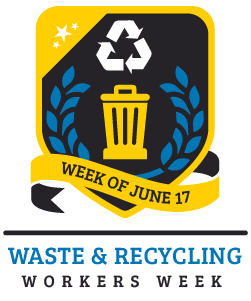As a nationwide shakeup in waste handling continues, Rogue Disposal & Recycling is rolling out new drop-off options for specific kinds of recyclables.

If you would like some information on how you can Go Green, check out the Jackson County Recycling Partnership’s website for tips on Waste Reduction, Reuse, Composting, Hazardous Waste alternatives as well as special events.
Visit www.jcrecycle.org today!
Our goal is to be the greenest company in Southern Oregon. We have worked hard to become an environmentally conscious leader by continually looking at ways to both improve and protect the environment — from small steps such as a new wheel wash that lowers dust pollution, to an innovative facility using landfill waste to create energy.
Our green initiatives are forward-thinking and beyond what laws and regulations require. Rogue Disposal & Recycling, Inc. is dedicated to new technology and the best management practices that exceed governmental mandates in a continued effort to provide superior service, affordable rates and a commitment to recycling and environmental protection.
Here are just a few examples of our green programs:
- Gas-to-Energy Facility. At Dry Creek Landfill, Inc., the methane gas-to-energy facility is our most ambitious green program to date. It’s a safe, state-of-the-art method of converting methane gas (a natural byproduct of waste decomposition in the landfill process) into enough electricity for up to 3,200 homes.
- Award-Winning Recycling Program. Curbside pickup service along with a large public drop-off center accepting a wide variety of recyclables. Recycling keeps more waste out of the landfill, saves valuable resources, reduces pollution and emissions, and prevents habitat destruction, among other benefits. In 2004, Rogue Disposal & Recycling Inc. was honored as “Recycler of the Year – Collector” by the Association of Oregon Recyclers.
- Yard Debris Recycling. This program keeps yard debris out of the landfill and turns it into organic compost certified by the Organic Materials Review Institute (OMRI) for organic farming.
- Diesel Exhaust Systems Retrofit. Waste collection trucks have been retrofitted to reduce particulate emissions by 50 percent. The Oregon DEQ awarded the company the Certificate of Appreciation for Air Quality Excellence for its leadership.
- E-Waste Recycling. Safely recycling “e-waste,” or obsolete electronics.
- Online Bill Pay. Reducing paper and ink usage.
- High Efficiency Lighting. New fixtures and ballasts in facilities offset 109 tons of carbon dioxide generated by fossil fuels (equivalent of removing over 19 automobiles from the road).
Rogue Disposal, like other sanitation companies across the country, is dealing with the effects of a global recycling market in crisis. China, long the biggest buyer of recycling materials, has almost entirely curtailed the once-consistent flow from the U.S. (the highest waste-producing country) and other countries in an effort to curb pollution. Within months, those impacts were visible on the local level, as the big U.S. recycling buyers, unable to make a profit, turned away materials from local waste management companies.
For Rogue Disposal, that meant the contents of residential red-lid recycling bins started winding up in the landfill earlier this month.
“The curbside has devalued to the point where it’s too expensive to recycle it,” said Garry Penning of Rogue Disposal.
While the curbside bins have lost their environmental edge for the foreseeable future, the company is extending other viable recycling options for residents willing to go the distance for their materials to be reused.
The drop-off site offering the most options in terms of materials it will accept is the recycling depot in White City. Located at 8001 Table Rock Road, the depot accepts cardboard, newspaper, milk jugs, tin and aluminum cans, and glass bottles and jars. While these items can still be placed for the time being in the red-lid bins, Penning said that dropping them off at the depot allows them to be reused rather than sent to the landfill.
The difference between the drop-off locations and the red-lid bins is the ability to cut down on “contaminants,” which are anything that doesn’t belong in the receptacle, including trash, the wrong types of materials, and items contaminated with food waste.
Those slip-ups may seem small to people who keep throwing non-recyclable materials into their red-lid bins, but they have significant effects. Chinese recycling importers have blamed contaminants for why they won’t keep taking U.S. recycling. When contaminants show up in a load of recycling, as happens often with the curbside bins, it often means that even viable materials have to be landfilled along with the undesirable items.
Penning said “wishful recycling” is the main cause behind the decision to send materials from red-lid bins to the landfill.
It’s critical that people become mindful about following the parameters of the drop-off locations, he said. Otherwise, those contents could also run the risk of ending up in the landfill.
“People need to recycle right,” he said. “So if it’s not newspaper, it shouldn’t go in the newspaper bin. If it’s not cardboard, it shouldn’t go into the cardboard bin.”
Rogue Disposal has also partnered with local grocers in the Rogue Valley to open five other glass bottle and jar drop-off locations. Ray’s Food Place in Phoenix, Central Point and Jacksonville, and Sherm’s Thunderbird and Food 4 Less in Medford accept glass that, when recycled properly without contaminants, can be reused.
Penning said the glass from those sites and the White City depot is ground up and used to line the Dry Creek Landfill. The quality of lining for a landfill is critical to prevent it from contaminating the surrounding environment. With proper lining, Rogue Disposal is able to divert and use the methane gas produced by the landfill to power generators that provide electricity for up to 3,000 homes in partnership with Pacific Power.
For now, the curbside program remains unchanged, but modifications are likely to come. Penning said glass may soon be banned from the red-lid bins if the materials continue to go to the landfill. Glass that’s thrown in the landfill is a liability, because it doesn’t break down. The company said it will update customers on any changes to curbside programs through its website, social media and fliers.














